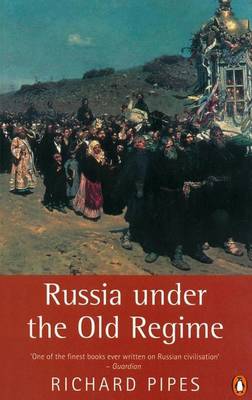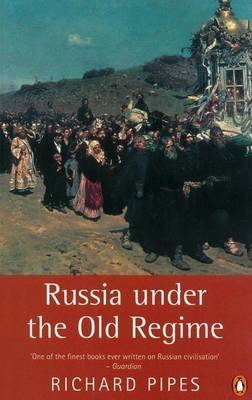
- Retrait gratuit dans votre magasin Club
- 7.000.000 titres dans notre catalogue
- Payer en toute sécurité
- Toujours un magasin près de chez vous
- Retrait gratuit dans votre magasin Club
- 7.000.0000 titres dans notre catalogue
- Payer en toute sécurité
- Toujours un magasin près de chez vous
Description
"For anyone who wants an insight into the nature of Russian society before the revolution, there is no doubt that Professor Pipes has written the book."--Lionel Kochan, Jewish Chronicle
This highly acclaimed study from Richard Pipes analyzes the evolution of the Russian state from the ninth century to the 1880s and its unique role in managing Russian society. The harsh geographical conditions and sheer size of the country prevented the creation of participatory government, and a "patrimonial" state emerged in which Russia was transformed into a gigantic royal domain. Richard Pipes traces these developments and goes on to analyze the political behavior of the principal social groupings--peasantry, nobility, middle-class, and clergy--and their failure to stand up to the increasing absolutism of the tsar. In order to strengthen his powers, legal and institutional bases were set up that led to the creation of a bureaucratic police state under the Communists. "A brilliant and provocative analysis . . . learned, judicious, witty and full of common sense."--John Keep, The Times Literary Supplement
"A lively, profound, often extremely subtle account of the making of the Russian state . . . For the serious student it is required reading which is also a delight. For the general reader with a minimal knowledge of Russian history and puzzled as to what makes the Russians tick, it lights up the whole field."--Edward Crankshaw, The Observer
"An excellent introduction, painstaking and enjoyable."--The New York Review of Books
"Pipes has produced a masterly interpretative history of tsarist Russa."--Choice
This highly acclaimed study from Richard Pipes analyzes the evolution of the Russian state from the ninth century to the 1880s and its unique role in managing Russian society. The harsh geographical conditions and sheer size of the country prevented the creation of participatory government, and a "patrimonial" state emerged in which Russia was transformed into a gigantic royal domain. Richard Pipes traces these developments and goes on to analyze the political behavior of the principal social groupings--peasantry, nobility, middle-class, and clergy--and their failure to stand up to the increasing absolutism of the tsar. In order to strengthen his powers, legal and institutional bases were set up that led to the creation of a bureaucratic police state under the Communists. "A brilliant and provocative analysis . . . learned, judicious, witty and full of common sense."--John Keep, The Times Literary Supplement
"A lively, profound, often extremely subtle account of the making of the Russian state . . . For the serious student it is required reading which is also a delight. For the general reader with a minimal knowledge of Russian history and puzzled as to what makes the Russians tick, it lights up the whole field."--Edward Crankshaw, The Observer
"An excellent introduction, painstaking and enjoyable."--The New York Review of Books
"Pipes has produced a masterly interpretative history of tsarist Russa."--Choice
Spécifications
Parties prenantes
- Auteur(s) :
- Editeur:
Contenu
- Nombre de pages :
- 384
- Langue:
- Anglais
Caractéristiques
- EAN:
- 9780140247688
- Date de parution :
- 01-01-97
- Format:
- Livre broché
- Format numérique:
- Trade paperback (VS)
- Dimensions :
- 129 mm x 198 mm
- Poids :
- 312 g

Les avis
Nous publions uniquement les avis qui respectent les conditions requises. Consultez nos conditions pour les avis.






